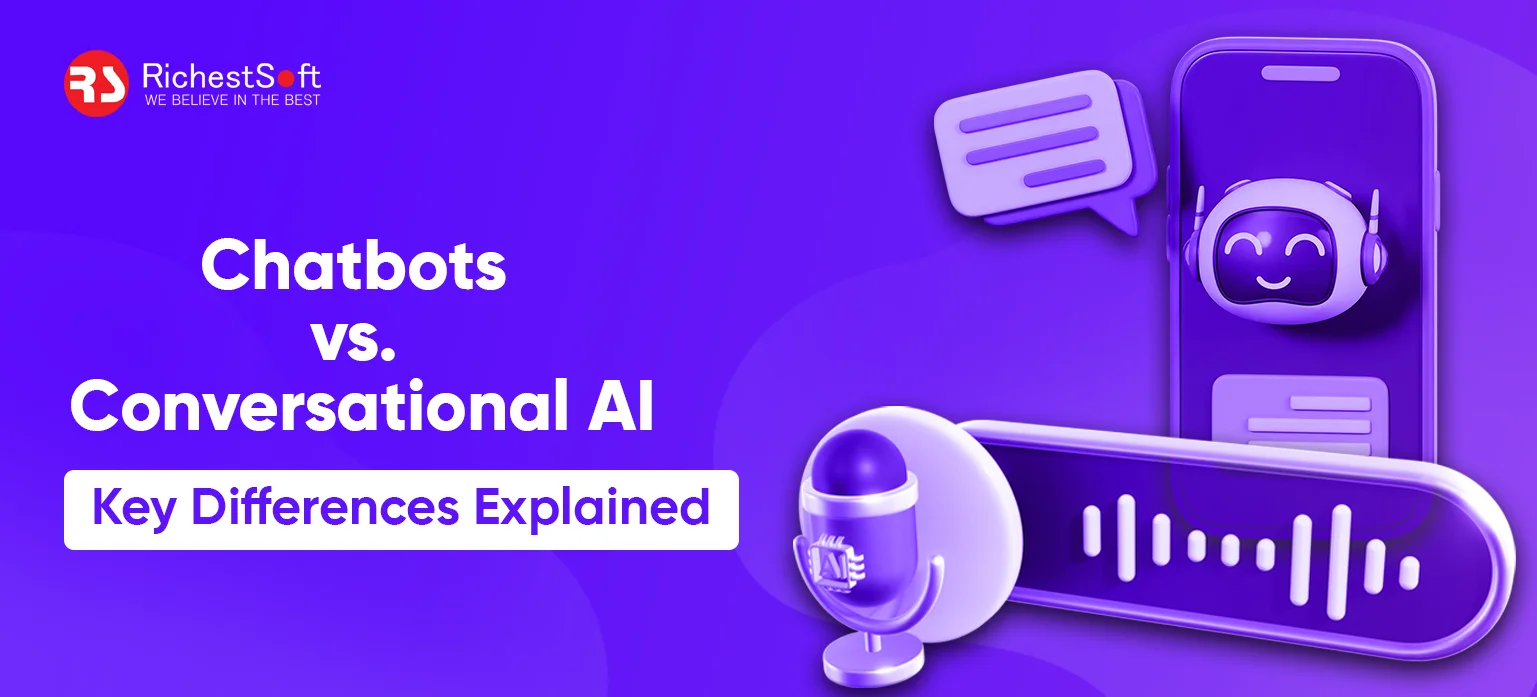August 25, 2025
In today’s time, modern businesses look for convenient ways to keep users engaged on their online platforms. Therefore, investing in chatbots and conversational AI tools is a smart move to support user engagement. However, which solution truly delivers superior results is a crucial question. Chatbots vs. conversational AI: what is the difference and which to choose? It is one of the most prominent questions.
Well, that’s because the integration of the right solution in an online platform influences user engagement and also enhances revenue, loyalty, and brand perception. Thus, enthusiasts who choose an appropriate solution based on their business objectives can achieve higher efficiency, deeper customer connections, and measurable ROI. So, want to know which solution is good to go for your business?
Keep reading this post. Below, we have provided a detailed comparison of Chatbots vs. conversational AI to help businesses determine which solution best suits their modern business needs.
An In-Depth Understanding of Both- Chatbots vs. Conversational AI
Many people take chatbots and conversational AI as the same thing. That is exactly where confusion begins. On the surface, both may appear alike, but the way they function and the value they bring are quite different. To clear the picture, let’s break them down one by one:
What are Chatbots
When you visit a website, a small window pops up asking if you need any help related to the brand or service; that is a chatbot. These are virtual assistants that are designed to interact with users through scripted commands and automated replies. It uses pre-written scripts, which help websites answer frequent user queries or solve their issues.
Enthusiasts invest in chatbot development when they need cost-friendly tools for first-level communication, quick resolutions, or round-the-clock availability. While chatbots cannot dive deep into complex conversations, they are reliable allies for managing high volumes of basic queries.
What is Conversational AI
Now think about apps like ChatGPT or Google Gemini. These are conversational AI solutions that go beyond simple scripts. They do not just follow commands; instead, they understand the context, tone, and intent of what users want. Conversational AI understands conversations, responds naturally, and engages with users in a way that feels closer to human interaction without involving any human support.
It is the preferred solution for creating meaningful conversations, scaling communication across channels, and delivering experiences tailored to each user.
Chatbots vs. Conversational AI: Key Insights For Modern Businesses
Businesses often assume chatbots and conversational AI function identically, overlooking their distinct advantages. This misunderstanding can hinder engagement, limit growth, and reduce ROI. Knowing their differences allows brands to invest strategically and achieve meaningful customer connections while optimizing resources efficiently. Here is the detailed understanding of Chatbots vs. Conversational AI difference:
Chatbots:
Chatbots act as rule-based digital assistants that manage simple, repetitive interactions, often deployed on websites, messaging apps, or e-commerce platforms. Their role in engagement is limited but precise, ideal for businesses seeking cost-effective automation. Here is how chatbots operate and their role in business:
- Automated Customer Replies
Chatbots respond instantly to standard queries like order status, hours, or policies. They reduce waiting times, maintain consistent engagement, and free up human agents for more complex interactions, offering businesses a predictable and efficient first line of support for large user volumes.
- Task Management
Chatbots handle repetitive tasks such as booking confirmations, collecting feedback, or guiding users through FAQs. This streamlines daily operations, minimizes human workload, and ensures businesses maintain smooth service delivery without compromising speed or accuracy across digital touchpoints.
- Integration Across Touchpoints
Chatbots connect seamlessly with websites, apps, and messaging platforms. This ensures uniform communication across channels while businesses enjoy easier deployment and centralized management of customer interactions, improving overall operational efficiency.
- Efficiency and Predictability
Chatbots maintain consistent responses for repeated queries, reducing errors and resource costs. Businesses benefit from predictable automation that scales easily, supporting high traffic volumes without requiring additional staff or extensive manual intervention.
Conversational AI:
Conversational AI leverages intelligent models to understand context, sentiment, and intent, handling multi-step and dynamic interactions across channels. Businesses use it to provide human-like engagement, advanced support, and scalable communication. Here is how conversational AI operates and its role in business:
- Context-Aware Dialogues
Conversational AI interprets intent, tone, and previous interactions, creating conversations that feel natural and personalized. Businesses can deliver meaningful engagement that builds stronger connections and improves satisfaction across diverse audiences.
- Complex Task Handling
It manages multi-step interactions like service guidance, account updates, or personalized recommendations. Companies benefit from reduced human intervention while ensuring users receive thorough and accurate assistance across multiple platforms.
- Cross-Channel Integration
Conversational AI links with CRM systems, apps, and social media, delivering consistent experiences. Brands gain insights into user behavior, enabling better strategies and personalized support while maintaining seamless engagement across digital channels.
Business Benefits- Chatbots vs. Conversational AI
Business Benefits of Chatbots:
Businesses often adopt chatbots for cost-effective engagement and reliable first-level support. While limited in flexibility, their role in automating simple queries is highly valuable. Here are some advantages of chatbots:
- Cost Efficiency
Chatbots reduce the need for large customer service teams by handling repetitive queries automatically. Businesses save operational costs while maintaining consistent response quality, enabling small to mid-sized companies to deliver timely support without expanding staff or infrastructure.
- Faster Response Times
Chatbots provide instant replies to common customer inquiries. This quick interaction improves user satisfaction, prevents churn, and allows businesses to maintain high engagement even during peak traffic periods, ensuring reliable service across digital touchpoints.
- Operational Consistency
By following predefined scripts, chatbots maintain uniform responses across queries. Companies gain predictability in communication, minimizing errors and ensuring every customer interaction aligns with brand standards and service expectations.
Business Benefits of Conversational AI:
Businesses seeking advanced engagement should recognize that conversational AI offers adaptive, smart communication beyond static scripts. These platforms respond naturally, retain context, and scale to meet diverse customer demands, providing a competitive edge for brands investing in modern digital strategies. Here are some advantages of investing in conversational AI solutions:
- Enhanced Personalization
Conversational AI analyzes context and prior interactions, enabling highly tailored responses. Businesses can engage users on a deeper level, improving satisfaction, trust, and loyalty while creating opportunities for personalized offers and targeted marketing strategies.
- Improved Customer Retention
The adaptive nature of conversational AI ensures smooth handling of complex queries and continuous engagement. Businesses retain customers by providing attentive, human-like experiences that respond to evolving user needs.
- Advanced Analytics
Conversational AI collects and analyzes interaction data, offering insights into user behavior, preferences, and pain points. Brands can optimize services, campaigns, and products based on actionable intelligence, enhancing ROI and long-term strategy.
- Scalable Engagement
Unlike static chatbots, conversational AI grows with user demand. Businesses can manage higher traffic volumes and diverse queries without adding human agents, ensuring scalable and efficient communication across multiple platforms.
Conclusion
Understanding the distinction between chatbots and conversational AI is essential for businesses aiming to optimize customer engagement and drive measurable ROI. While chatbots provide structured support for routine queries, conversational AI delivers adaptive, human-like interactions across multiple channels, enabling deeper connections and personalized experiences. Selecting the right solution depends on brand goals, audience expectations, and scalability requirements.
Companies that integrate these technologies effectively can streamline operations, enhance customer satisfaction, and unlock new revenue opportunities. RichestSoft brings expertise in developing both chatbots and conversational AI solutions tailored to business needs. Our proficiency ensures that digital platforms not only function efficiently but also elevate user engagement, offering scalable, future-ready solutions for modern enterprises seeking strategic advantage.
 +1 315 210 4488
+1 315 210 4488 +91 99888 06489
+91 99888 06489










